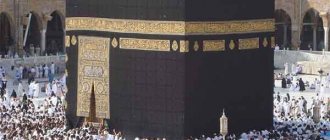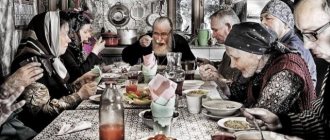In Orthodox life, a special prayer must be read before meals. It is she who is considered a reminder to a believer that man does not live by bread alone and spiritual values are of greater importance to him. In the prayer before meals, people thank the Lord for sending them food and for the fact that they can share it with their household.
The Orthodox faith implies that food should not be used for gluttony, which is a sin. But if it is blessed by prayer, then it will provide enough energy for the health of the body and mind. This means that a person will learn to correctly set life priorities and live righteously.
What is dua?
- In the most general understanding of dua in the religion of Islam, it is a prayer addressed to Allah. This is one of the most important forms of worshiping Allah and includes any request for help or protection.
- The main thing that is inherent in such a request is the recognition of one’s own helplessness both in front of life’s difficulties and in front of Allah himself.
- That is why the servant of God turns to God for support, admitting his own weakness and trusting in the strength of God.
Prayer Request
How to make a dua to Allah with a request?
- Dua can be pronounced both alone and collectively, during Muslim rituals. It is necessary to say a prayer with all sincerity , with concentration, believing that it will be heard.
- Under no circumstances should you turn to Allah with dua only “for order”; such carelessness will be noticed by the Creator. Dua can and should be pronounced in any situation and in any life circumstances .
- It is necessary to begin the dua with praise to the Almighty and with a prayer in which they ask to bring peace and blessings to the Prophet Muhammad.
To properly address Allah and for your prayer to be heard and accepted, you must adhere to certain rules:
- An appeal is best addressed to Allah at the time when it is most often accepted.
- You should not strive to rhyme words on purpose.
- Before dua, it is necessary to perform ablution and put on clean clothes.
- When making a request, you need to admit your inability to cope on your own, your helplessness.
- The dua must be sincere, coming from the depths of the heart.
- During prayer, it is necessary to feel convinced that Allah hears the one praying, and to pronounce the dua with determination.
- With all the determination and perseverance, there is no need to rush the course of events or be impatient.
- How to pronounce dua and behave during prayer is necessary with humility and respect.
- Turning to Allah should be a necessity for a Muslim not only in difficult moments, but also in joyful moments.
- The dua is pronounced out loud, but the voice of the person praying should not sound loud.
- An appeal to the Creator should also include a confession of one’s own sins and a request for their forgiveness.
- It is necessary to thank Allah for all the blessings given to the praying person.
- It is permissible to recite Dua three times.
- If possible, it is best to pronounce dua while facing the Kaaba.
- a personal request is first made , and then requests for others.
- The more epithets and names of the Almighty the dua contains, the better. Also, appeal can be contained in good deeds performed, which must be carried out before pronouncing the dua and talk about this, turning to Allah with a request to accept the dua.
- When saying a prayer, you must be in your own (not stolen or taken from someone) clothes. The same goes for food and drink.
- Palms should be raised to shoulder level.
- Try not to look at the sky while making dua.
- You cannot ask to change the predetermined: for example, a woman should not ask to become a man, or a tall person to become short, to be in several places at the same time, and other things that are impossible from the point of view of nature and common sense.
- Both the one who reads the dua and the one who listens should end the dua with the word “Amin” and then wipe their face with their palms.
- You need to say dua while sitting in the tashahhud .
- Apostasy is unacceptable. You cannot doubt the mercy of Allah, fail to fulfill obligations, perform actions that are not related to prayer, or utter the wrong words, even in your thoughts.
- You cannot laugh during dua; only a slight smile intended for Allah is permissible.
Muslim prayer text
The Great Muhammad told duas suitable for meals. Words of prayer before and after eating food are obligatory. The texts are used after quenching thirst with water or drinking milk. Sacred lines are read to oneself, in gratitude to the hospitable hosts who set the table.
Before eating
The Lord gives man worldly blessings. He cannot exist without food. The Qur'an sura describes duas before preparing food. A simple prayer to say is بِسْمِ الله. Translation into Russian: With the name of God on your lips. The words are pronounced: Bismi-L-lyah!. After reading the text, begin the meal.
Do you need the help of magical powers?
Get an answer to your burning question from a magician and healer. Write about the problem right now, and an expert will suggest a solution online!
Ask a free question View all questions
Use the dua بِسْمِ اللهِ في أَوَّلِهِ وَآخِـرِه. The text is translated “With the name of one Allah on the lips at the beginning and end of the meal.” Transcription of yals to be said before and after meals:
“Bismi-L-lahi fi-av-vali-hi wa-akhyrihi!”
Dua اللّهُـمَّ بارِكْ لَنا فيهِ وَأَطْـعِمْنا خَـيْراً مِنْـه stands for “O great Allah, grant blessings , feed me the best food!” They pronounce:
Allahuma, bari-ik la-na fi-hi wa-aty-im-na hairan-min-hu!
If another person was cooking: wife, sister, family of friends, colleagues, the Islamic religion advises reading the dua of gratitude before eating: غْفِـرْ لَهُـمْ وَارْحَمْهُمْ. Approximate meaning: “O God, send down a blessing on them, for what you gave them, grant forgiveness, pardon!” Read the prayer:
Allahuma, barik-la-hum fi-ma-raz-zakta-hum, wa-gfir-la-hum wa-rham hum!
Dua اللّهُـمَّ أَطْعِمْ مَن أَطْعَمَني، وَاسْقِ مَن سقاني meaning “Great God, give food to the one who shared the trap with me Zu, shared water, quenched my thirst!” You can read a prayer before and after eating or drinking. The syllables are pronounced:
Allahuma, aty-ym mai-a-tama-ni, wa-ski man-saka-ni!
After meal
When breakfast, lunch, dinner has come to an end, they express gratitude. They say dua after eating in Arabic غَـيْرِ حَوْلٍ مِنِّي وَلا قُوَّة. The meaning of the prayer is: “I praise Allah for giving me food, for giving me this, although I don’t have that kind of energy or power.” They pronounce:
Alhamduli-L-lahi l-lyazi at-tama-ni-haza wa-raza-aka-ni-hi-min gairi-haulin min-ni-wa la-kuv-vatin.
Variation of the dua expressing gratitude for the gifts before the meal: فيه، غَيْرَ مَكْفِيٍّ وَلا مُوَدَّعٍ وَلا مُسْتَغْـنىً عَنْـهُ رَب ُّـنا. Meaning: I praise Allah, great gratitude, sincere, bringing good, O God!” To perform a prayer ritual after eating or drinking, say:
Alhamduli-L-lahi hamdan-kyasiran, tai-iban, mubarakyan-fi-hi, gayra-makfi-yin, wa-la muwad-da-ain wa-la mus-tagnan-a-an-hu! Slave-ba-na! Try to pronounce the dua constantly. This should become a habit.
A Muslim can recite an effective surah before and after eating: َلَنَا ْمُسْلِمِينَ. The person thanks Allah, who gave him food, drinks, and guided him on the right path. They pronounce:
Al-hamdu-lil-la-ahi l-lyazii at-tamana-a wa-saka-anaa wa-ja-alana-a minal-musli-mii-in.
If milk was drunk, read the dua اللَّهُمَّ بَارِكْ لَنَا فِيهِ وَزِدْنَا مِنْهُ. The Lord will make the drink for good and bring more good things. In Russian, the prayer before a meal sounds:
Allahuma barik-liana fihi-wa zidna-min-nhu.
After drinking water, use dua تِهِ ، وَلَمْ يَجْعَلْهُ ملحًا أُجَاجًا بذنوبنا. If the meal included liquid dishes or other food, the lines do not apply. I use words after drinking liquid. Translation: “I praise God for creating the sweetness of water, making it fresh out of his own free will, and not turning the bitterness into salt before drinking it because of human sins.” Pronounced dua:
Alhamdulil-lahi al-lyazi jagalahu gazab-ban-fura-at-tat-tana birahma-tihi, valam yaajgalhu-malakhan aja-jan biznubinya.
You need to pronounce the text after emptying the glass. The text is suitable for water: for food, other drinks do not pronounce it.
When is the right time to make dua to Allah?
The most favorable times for making dua to Allah are the following moments:
- Night of Predestination (also called Laylat-al-qadr);
- Tahajjudd, the last third of the current night;
- After the five obligatory daily prayers have been performed;
- When it rains;
- During Ramadan;
- The interval between the call to prayer (adhan) and the second call (ikamat);
- At the time when Hajj is performed;
- When parents offer prayer for their children;
- When an oppressed person prays against his oppressor;
- During the clash between Muslims and infidels;
- The Traveler's Prayer;
- Prayer of the fasting person before breaking the fast;
- If the worshiper drinks the water of the ZamZam spring with pure intentions;
- The Prayer of a Just Ruler;
- During the prostration (its name is sujud) of the person praying;
- While reading dua to an absent Muslim;
- During the tenth day of Dhul-Hijjah, which is the day of Arafah, and the prayer is said on his mountain;
- After performing ablution;
- In a critical situation, if someone in dire need prays;
- If during the process of prayer the following prayer is said: “La ilaha illya anta subhanaka inni kuntu mina-zzalimin”;
- After reading at-tahiyat and salawat on the Prophet Muhammad;
- If, after performing ablution, a Muslim has already gone to bed, but gets up to say dua;
- The prayer of an obedient child for his father and mother.
Types of dua to Allah
Dua can be addressed to Allah for many reasons. The main rule is that they must be aimed at good.
Among these targeted duas:
- Daily Prayer;
- Morning dua;
- Dua before going to bed;
- Dua at the end of the prayer;
- Before eating and after finishing the meal;
- Dua after adhan;
- For successful trading;
- Dua for getting rid of debts;
- Dua for conceiving a child;
- To successfully pass the exams;
- To make the right decision or choice (Istikhara supplication);
- Dua for a safe journey;
- Dua for a successful marriage;
- Dua to cleanse the house;
- Dua to overcome laziness;
- Dua for the dead;
- Traditional dua tajnama, mashloul; ganjul arsh; istighfar, read for repentance, yasin, subhanaka, dua of the prophet Yunus and frequent duas of the Prophet.
Duas to say before and after meals
By tradition, every Monday we introduce our readers to duas - prayers that a Muslim should know. A believer turns to the Lord not only when difficulties or problems befall him; the sign of true faith is gratitude and contentment.
Unfortunately, in the modern world it is not so easy to preserve and develop these qualities. The desire for a better life, of course, is good, but often it turns into a meaningless pursuit of material things, where there is no place for spirituality and sincerity. Therefore, it is important to always remember Allah. Even eating can become worship if you realize the value of what the Almighty has given us.
There are certain rules for eating in the Sunnah. For example, the best thing is to eat what is closest to you, and not what is located in the middle. In addition, it is not advisable to eat hot food, and it is also not recommended to smell it or blow on it. By the way, talking about good things while eating is allowed. You can read about these and other sunnahs in the article: 11 sunnahs of eating
And, of course, it is important to make dua before and after eating.
اَللَّهُمَّ باَرِكْ لَنَا فِيماَ رَزَقْتَناَ وَ قِناَ عَذاَبَ الن َّارِ
Transliteration: Allahumma barik lyana fima razaktana wa kyna azaban-nar;
Translation: Oh Allah! Bless what You have given us as inheritance and protect us from the torment of fire;
All rights reserved. سْلِمِينَ
Transliteration: Al-hamdu lil-lyahi llazii at'amanaa wa sakaanaa wa ja'alanaa muslimin;
Translation: Praise be to the Almighty, Who fed us, gave us drink and made us Muslims;
Source
How to correctly formulate a request in dua to Allah?
- By asking Allah for something small, a Muslim seems to doubt the power of the Almighty.
- Sometimes prayer is said automatically and not from the heart.
- And it happens that they turn to Allah with a request without believing that it will be fulfilled. In such cases, one should not wait for an answer to the dua.
Therefore, in order to correctly formulate your appeal to Allah, you need to consider the following points:
- Why does a Muslim ask, what exactly does he want to get as a result?
- You should formulate your request as simply and clearly as possible , without ambiguous interpretations. For example: “I appeal to you, Allah, with a prayer to make my heart healthy!”
- It is necessary to address the Almighty sincerely, addressing your words specifically to Allah, and not just to “higher powers.”
- If a Muslim himself does not believe in the Almighty’s answer to his dua, there is no point in contacting him. There must be faith in your heart that Allah will not ignore your request. Therefore, after pronouncing the dua, you need to thank him sincerely, as if the request has already been fulfilled.
- Dua to Allah is also a way for a Muslim to understand what he himself must do in order to achieve his goal. After all, waiting only for the mercy of the Almighty, without doing anything to fulfill what you want, is insufficient and wrong.
Dua after eating text in Russian
Dua (prayer) read after eating, here is the text in Russian:
"Alhamdulillahi-llazi at-amana wa sak'ana wa ja-'alyan minal-muslimin"
Meaning: “All praise be to Allah Almighty, Who gives us food and drink, and made us Muslims” (Abu Dawud and at-Tirmidhi).
Reading dua and washing hands before and after eating is sunnah. The hadith says: “Washing hands before and after eating is considered to be the barakah of food” (Abu Dawud and at-Tirmidhi).
Dua before meals (prayer before meals according to Islam)
The meal should always begin with the word:
«Bismillah! (In the name of Allah)."
And if anyone forgets to say this before eating, if he remembers that he forgot, then let him say:
“Bismillahi fi avali-hi va ahyri-hi!”
Meaning: “With the name of Allah at the beginning and end of the meal!”
Dua before meals
"Allahumma, barik lyana fihi wa at'imna khairan minhu"
Translation of the meaning into Russian: “O Allah, make this blessed for us and feed us with what is better than this.”
Dua after meals in Arabic
الْحَمْدُ لِلَّهِ الَّذِي أَطْعَمَنَا وَسَقَانَا وَجَعَلَنَا مِن َ الْمُسْلِمِينَ
Dua after eating in Tatar language
“Ал-хәмү ліләәһilliәzii әүүә сәкаанәә үә җәgalәnәә minәl muslimiin. “Үәл-хәмү lilliәәһi rabbil gaalәmiin.”
Ash dogasy, tatarcha mәganese:
(Alla һyga maktau bulsyn. Bezne ashatkan, echertkәn һәm mөselman buluybyzny nasyp әylәgәn Allahyga maktau bulsyn. Maktau bulsyn Galәmnarneң Rabbysy - Allah).
May Allah Almighty accept our prayers and add us to the list of his grateful slaves.
Source
What is the merit of dua to Allah?
In the Islamic religion, dua is one of the greatest types of worship, representing a strong, indestructible connection between a person and God.
Among the most significant advantages of dua are the following:
- Dua contributes to the fulfillment of the order of Allah the Almighty, which states the need to turn to him with prayers.
- Dua, according to the Prophet Muhammad, is one of the forms of worship of the Almighty.
- Dua is a way that helps to receive Allah's help in getting rid of suffering.
- Thanks to dua, a true Muslim believer always feels the presence of Allah nearby.
How to properly make dua to Allah after prayer?
After a Muslim has performed prayer, he must recite the following dua:
Words
- As the Prophet Muhammad says, when reading after prayer 33 times each of the following ritual exclamations and prayers: “Subhan-Allah”, “Alhamdulil-Llah”, “Allahu Akbar”, completed with the words: “La ilaha illa Allahu wahdahu la sharika Lyah, lyahul mulku wa lyahul hamdu wa hua 'ala kulli shayin kadir,” a Muslim will receive forgiveness of sins from the Almighty.
- Raising his hands to chest level and turning his palms up, a Muslim must read the duas corresponding to those that the Prophet Muhammad said after finishing the prayer. You can read other duas that comply with Sharia.
- Having finished reading the adhkars, the believer can proceed to making dua.
How to read the morning prayer Fajr (VIDEO)
Starting the day by worshiping Allah Almighty is an obligation for Muslims. By reading the obligatory prayer five times a day, followers of the Final Messenger of God (s.g.v.) constantly keep themselves in good shape, charged with positive energy and a creative attitude in order to make the world around them a better place.
It is noteworthy that the five prayers, the observance of which is an obligation for the faithful, are located throughout the day in such a way that a Muslim can engage in secular affairs and think about Allah, thereby correlating his actions with moral, ethical and religious norms. Thus, in Surah “Spider” the following words of the Almighty Creator about prayer-namaz are given:
You are prescribed to read and pray (perform namaz) - so do it! Truly, obligatory prayer helps to protect oneself from the vile world around a person and everything that deserves condemnation (29:45)
The first prayer a Muslim must perform throughout the day is morning prayer. It is also called namaz sabah (but more often - fajr).
When can you read morning prayer?
The answer to this question should be preceded by a small hadith in which the Prophet of Islam (s.a.w.) tells Muslims about the types of dawn - false and correct. If the first is a vertical strip of light on the horizon, which does not last very long, after which darkness sets in again, then the second type is the dawn, which entangles the entire horizon and marks the end of the night. Actually, from the moment the second - true - dawn begins, the time of morning prayer begins (a hadith with this content is in the collection of al-Hakim). It lasts until the sun rises.
It is necessary to keep in mind that a false dawn is a kind of signal that the real one will appear very soon. During fasting, a vertical stripe of light does not indicate anything reprehensible in the sense that you can still eat food. But after the onset of true dawn, the time of Suhoor comes to an end, and the Muslim must begin the Fajr prayer.
Information about what time morning prayer is read in Russian cities, as well as in the CIS, is presented at the link.
Procedure for performing the Sabah prayer
The Fajr prayer is very simple in its structure. It includes two rakat (rakaat) of sunnat and the same number of farda. In general, their performance is almost identical, with the exception of a few points that will be mentioned below. Here we will describe how to read the morning prayer using the example of two fard rakqats. Follow these instructions and also watch the video.
Please note that the body positions of the praying person described below in the text apply to men. For women they are slightly different.
2 rakat fard of morning prayer
Rakagat #1
Intention (niyat). Everything begins with intention and will be judged by it - this is precisely the message of one of the most famous sayings of the Prophet Muhammad (s.a.w.) (see collections of Al-Bukhari and Muslim). Namaz is no exception. To perform this element of prayer, you do not need to memorize any special prayer formulas. It is enough just to think that now the time has come for Fajr prayer, and the believer is ready for it. You can also silently formulate a phrase about your intention to pray (in any language). In Russian it may sound something like this: “Oh, Master! I intend to recite two rakat fard of the Sabah prayer.”
After pronouncing the intention, the believer, standing towards the qibla, loudly pronounces takbir-tahrim (the words “Allahu Akbar” ), raises his hands to the level of his head (with the backs of his palms back). At this moment, the thumbs touch the earlobes (if the person praying is a representative of the Hanafi or Maliki madhhab) or not (for Shafiites and Hanbalites). It is from this starting point that a person fully begins morning prayer - he must not be distracted, say extraneous words, or look at everything around him. During worship, you should stand quietly, meekly, directing your gaze to the place where you will bow to the ground.
Dua-sana. The believer folds his hands on his stomach so that the right palm clasps the left wrist with the outer fingers of the hand. Hanafis place their hands folded in this way below the navel, Shafi'is - above, and Hanbalis are free to decide what is more convenient for them. The Malikites even freely lower their hands.
Having taken the described position (it is called qiyam ), you need to read the dua-sana. There are certain differences in its formulation among the Shafiites and representatives of other directions of theological and legal thought of Sunni Islam. Let's give both versions.
The Shafi'is recite the following text:
Uajakhtu uajhiya lilyazii fataras-samauaati wal-ard, haniyafyam Muslima, ua maa ana minal-mushrikiin, innas-salati ua nusuki, ua makhyaya ua mamati lilLyahi Rabbil-'alamiin, la sharika lyakh, wa bi zyalika umirtu wa ana minal-muslimiin
Translation: “I direct my face towards the One who created the heavens and the earth. I am not one of the polytheists who worship someone else, because, truly, my faith and actions based on it, life and death - all this is with Allah, Who is alone and has no partners. This is what I am obliged to do, I am truly a believing Muslim.”
In other madhhabs a different – shorter – text is read:
Subhanyaka Allahummya wa bihamdikya, wa Tabarakasmukya, wa ta'ala Jaddukya, wa la Ilyaha gairuk
Translation: “Praise be to You, Almighty Creator! Your name is the greatest, nothing compares to it. No one is worthy to be equal to You. No one is worthy to be worshiped except You."
Koranic suras and verses in qiyam. After the prayer-san, it is necessary to say ta'auuz and bismillah: "A'uzu billahi minashshaitanir-rahim, bismillahir-Rahmyanir-Rahim" (“I appeal to Allah Almighty from the machinations of Satan, who must be stoned. In the name of Allah, the Gracious and the Merciful" ) and read out loud the first surah of the Koran “Al-Fatiha”. Following it is an additional sura (usually short, for example, “Al-Falak”) or at least 3 verses from any other sura (if it is long).
Ruku' (waist bow). After reading the sacred verses from the Book of Allah and saying takbir (“Allahu Akbar”), we bow to the waist. To do this, we rest the center of our palms on our kneecaps, and our back bends so as to be as parallel to the floor as possible. The gaze is fixed on the feet. That is, if you look at the person praying from the side, his position will be similar to the letter “G”. In a bow from the waist, the believer says the formula three times: “Subhanya Rabbial-'Azym” (“The Most Pure [from all bad, negative] is our Master”). Next he says the formula “Sami'Allahu limyan Khyamide” (“Allah Almighty knows everything, all the glorifications [that come to Him]”). Having said this, the worshiper comes out of the waist bow and takes a vertical position (here the hands are lowered at the seams), after which he says once the phrase “Rabbanya, LaKal-hyamde” (“O Lord of the worlds! All these praises are directed to you”).
Sajdah (prostration or sujud). Having proclaimed takbir (“Allahu Akbar”), we begin to bow to the ground, first lowering our knees to the surface of the floor, and then our hands and head. The forehead and nose are touched to the floor, the eyes remain open. The hands are positioned at head level so that the elbows are raised above the floor. Shafiites have their palms in line with their shoulders, and their elbows are also off the floor. Hanbalites prostrate differently: first they touch the floor with their hands, and only after them their knees.
Lowering his head to the floor, the worshiper says to himself three times: “Subhanya Rabbi al-A'la” (“Most pure [from any negativity] is My Great Lord”). After this, the worshiper pronounces takbir and leaves the sajda for a few seconds, sitting on his left leg and holding his right leg in the so-called half position - the body weight does not fall on it, it is slightly tucked to the side, with the toes facing in the direction of the qibla. The hands are on the knees. Next, the believer, having said takbir, again goes into a state of prostration, where he pronounces the same phrase “Subhanya Rabbi al-A'la .
Returning from Sujud is marked by takbir and taking up the vertical position of the kyyam. We proceed to the next rakqat of the fard part of the Fajr prayer.
Rakagat #2
Here in qiyam, the believer no longer reads the dua-san, but immediately moves on to the “Fatiha” surah, followed by an additional one (for example, “An-Nas”). Further, everything is similar to the previous rakat - ruku' and sajdah.
Differences begin at the end of Sujud. In the 2nd rakat, after prostration, a person sits in the same position as in the middle of both prostrations. It is called ku'ud (literally “sitting” in Arabic). , dua tashahhud is pronounced to oneself :
At-takhiyatu lillahi was-salyauatu uat-tayibyat. Assalamu 'alaika, ayuhannabiyu, wa rahmatullahi uabyarakatuhu. Assalamu 'alaynya wa 'ala 'yybadillahi-s-salihiin. Ashhadu al-la-ilaha illa-Llahu, wa ashhadu an-na Muhammadan gabduhu wa Rasulukh
Translation: “Our greetings, prayers, supplications and praises to You, Almighty. Peace be upon you, our Prophet, mercy upon you from Allah Almighty, Lord of the worlds, and His blessings. I bear witness that there is no one worthy of worship except Allah Almighty. I testify that Muhammad is His servant and messenger."
Often dua tashshahud is accompanied by special gestures. At the moment of pronouncing “Ashhadu al-la-ilayaha illya-Allahu,” the index finger of the right hand is raised until the second part of the testimony “wa ashhadu an-na...” begins.
Then comes another prayer - dua salawat :
Allahumma salli 'ala Muhammadin wa 'ala Ali Muhammad. Kyama salaita 'ala Ibrahima wa 'ala Ali Ibrahima. Innyaka hamiidun majid. Allahumma barik 'ala Muhammadin wa 'ala Ali Muhammad. Kyama baraktya 'ala Ibrahima wa 'ala ali Ibrahima, innyaka hamiidun majid
Translation: “O Allah Almighty! Bless Muhammad and his family as You blessed Ibrahim and his family. Verily, You are Worthy of Praise. O Almighty Creator! Send blessings upon Muhammad and his family as You blessed Ibrahim and his family. Verily, You are worthy of glory and praise.”
Following the salawat is part of the verse from Surah Al-Baqarah:
Rabbanya-attiinya fid-dunya hasanatyau-ua fil akhirati hassanatau ua kyina gazabannar (2:201)
Translation: “Oh, our Great Master! Give us goodness in this world and the Eternal world. Provide us with protection from Hell and its torments.”
The person praying reads this to himself, as well as the tashahhud with salawat.
Taslim (greeting). Finally, the time of greeting comes, when the reader of the prayer turns his head first to the right and then to the left, directing his gaze to his shoulders. At each turn, you should say out loud the words: “As-salamu galaikum wa rahmatullaa.” (“Greetings to you and the mercy of Allah”). By “you” here we mean other believers who pray nearby, angels who record our deeds, and Muslim jinn.
Then the worshiper says “Astaghfirullahi” (“Forgive me, Allah Almighty”) three times and recites the dua greetings :
Allahumma, Antas-salamu uaminKas-salaam. Tabarakta ya hall-jalali wal-ikram
Translation: “O Almighty Allah! You are the world, and You are the source of the world. Grant us Your blessing."
When making this dua, you should keep your hands opposite your chest. Having finished it, “Amen” is pronounced, and the believer wipes his face with his palms. This completes the two rakat of the fard part of the Sabah prayer. The worshiper should begin reading the verse of al-Kursi, performing dhikrs (tasbiha) and the final dua (as shown in the video below).
Sunnat in 2 rakat
As mentioned above, the sunnat in the Fajr prayer is practically no different from the obligatory part of the prayer. You just need to remember that takbirs, Koranic surahs and other elements that are pronounced loudly by men in fard, are not spoken out loud during sunnat rakaghats. In addition, it should be recalled that the rak'ahs of the sunnat in the sabah prayer precede the fard.
Dua-qunoot as part of Fajr prayer
This is perhaps one of the few debatable points that concern this prayer. True, the level of intensity in discussions between different theological and legal schools is relatively low. In particular, the Shafiites are confident that dua qunoot is sunnah, since its recitation was practiced by the Prophet (s.a.w.). The basis for this statement is a hadith in the collection of al-Hakim, which narrates how in the fard part of the morning prayer for the Mercy of the Worlds, Muhammad (s.g.w.) after leaving ruku ' in the 2nd rakqat, raising his hands to chest level, I read this dua:
Allahummya, ikhdinya (a) name (a)n hyadyaitya vya gyafinya (a) name (a)n 'afyaytya. Vya tävällänä fiimän tävälläitä. Vya bya(a)rik lanya(a) name(s) a'tyakya. Vya kynya (a) sharra mya (a) kadaitya. Fiinnyakya takdii vya la(a) yukda 'alaikya. Vya innyahu la ya'izzu myan 'adyaytya. Tyya (a) raktya Rabbi (a) vya tjaya (a) laytya. Falyakal-hyamdu 'ala(a) mya(a) kadaitya. Nyastyagfirukya nyutubu ilyaykya. Vya sally-lLahummya gyala (a) sayyidinya (a) Muhyammadin, an-Nyabiyi-l-ummiyi vya gyala (a) aalihi vya sahibihi vya sallylim
Translation of the text of dua-qunut: “O Great Master! Make us the same as You made those who, according to Your will, are on the straight path - guide us along this path! We ask You to protect us from adversity, like those who were delivered from it by You! Grant us blessings on what You have determined for us. Protect us from evil! It is You who rule everything, and Your decision changes everything. No one who has received Your support can be disadvantaged. No one can achieve strength and power who is deprived of Your mercy. Your blessings are great, You are pure from all negative things that may be attributed to You out of ignorance or unbelief. Forgive us, Almighty. And we ask for blessings for our prophet Muhammad and his family, as well as his Sahabah."
Hanafis and other Sunnis consider the hadith from al-Hakim's collection to be weak. In addition, there is an opinion according to which the Messenger of the Almighty (s.g.w.) read dua-kunut in the Fajr prayer for only one month, but after that he abandoned this practice.
If you adhere to the Shafi'i madhhab and are going to say dua qunoot in namaz sabah, then you need to adhere to the following routine:
After coming out of the bow and saying “Rabbana, LaKal-hyamde” , hold your hands at chest level, pointing your palms towards the sky, and read the above text of dua-kunut. Next, go to Sujud and complete the prayer as described above.
How to properly make dua to Allah for women?
- Female physiology related to menstrual or postpartum bleeding often becomes a topic for a similar question. Shariah does not contain a text in which there would be a clear prohibition on a woman making dua during such a period, in contrast to a person who is in defilement. On such days, a woman should recite the Quran by heart without touching the Quranic scroll with her hands.
- The difference between the defiled state (that is, after sexual intercourse has occurred) and the menstrual period is in its duration. It is believed that after having sexual intercourse, a person can wash himself quickly enough (with water, earth, sand - whatever is at hand) and begin prayer.
- During such a period, a woman does not have access to complete ablution , since it lasts several days. It is not recommended to interrupt the reading of the Quran and your appeals to Allah, since communication with the Almighty should be regular.
Dua after breaking the fast (iftar)
اَللَّهُمَّ لَكَ صُمْتُ وَ بِكَ آمَنْتُ وَ عَلَيْكَ تَوَكَّلْتُ وَ عَلَى رِزْقِكَ أَفْطَرْتُ. فَاغْفِرْ لِي يَا غَفَّارُ مَا قَدَّمْتُ وَ مَا أَخَّرْتُ
“O Allah, for Your sake I fasted, I believed in You, I relied on You, I broke my fast with Your food. O Forgiving One, forgive me the sins that I have committed or will commit.”
Translit: Allahumma lakya sumtu, wa bikya aamantu, wa 'alaikya tavakkyaltu, wa 'ala rizkykya aftartu, fagfirlii ya gaffaaru maa kaddamtu wa maa akhhartu
How to properly make dua to Allah for the deceased?
For the deceased
- These are some examples of dua for a deceased person that helps the deceased to receive forgiveness. You can read dua for the deceased both at home and in the mosque. Particularly significant and powerful is the dua pronounced by relatives, first of all, by a righteous child. At the same time, dua can only be read for a deceased Muslim, but prayer over infidels is not allowed, even if they are relatives. Allah does not allow anyone to do this, not even his Prophets.
- You can not only read dua for a deceased Muslim, as well as the Janaza prayer, but also fulfill vows in the name of Allah that he did not manage to fulfill. A son can perform Hajj for his deceased father, a daughter for her mother, since their obligations are a duty to Allah. And the dead, according to the Prophet Muhammad, will be rewarded for this.
- The benefit of the deceased is brought not only by dua for him, but also by good deeds performed during life, which remain with him in the next world. He will also be helped by all the good that he did to people, the knowledge that he passed on to them - this is how his alms continue on earth . In addition, the deceased will benefit from the Koran he left as an inheritance, a house or mosque he built, righteous children, rivers, wells he built and, of course, alms distributed to him.
The following dua can be read for a deceased child:
For a child
- In Islam, parents are especially revered. The Koran speaks of the need to ask Allah to have mercy on them, and the Prophet Muhammad calls submission to parents and the desire to do good deeds for them the best deed pleasing to Allah after prayer.
- One such good deed is dua offered for parents, which brings the blessings of Allah to the Muslim.
Dua after breaking the fast (iftar)
اَللَّهُمَّ لَكَ صُمْتُ وَ عَلَى رِزْقِكَ أَفْطَرْتُ وَ عَلَيْكَ ت َوَكَّلْتُ وَ بِكَ آمَنتُ ذَهَبَ الظَّمَأُ وَ ابْتَلَّتِ الْعُرُوق ُ وَ ثَبَتَ الْأَجْرُ إِنْ شَاءَ اللهُ تَعَلَى يَا وَاسِعَ الْفَضْلِ اغْفِرْ لِي اَلْحَمْدُ لِلهِ الَّذِي أَعَانَنِي فَصُمْتُ وَ رَزَقَ نِي فَأَفْطَرْتُ
Translation: O Supreme Lord, I fasted for Your sake [so that You may be pleased with me]. I ended my fast with what You gave me. I relied on You and believed in You. The thirst has gone, the veins have been filled with moisture, and the reward has been established, if You wish. O Possessor of boundless mercy, forgive my sins. Praise be to the Lord, who helped me fast and provided me with what I broke my fast with
Translit: Allahumma lakya sumtu wa 'alaya rizkykya aftartu wa 'alaikya tavakkyaltu va bikya aamant. Zehebe zzomeu wabtellatil-'uruuku wa sebetal-ajru in she'allaahu ta'ala. Ya vaasial-fadligfir lii. Alhamdu lillayahil-lyazi e'aananiya fa sumtu wa razakaniye fa aftart
Source
Is it necessary to read dua to Allah in Arabic?
- Not every Muslim speaks Arabic, and therefore may pronounce words incorrectly. According to Sheikh ul-Islam ibn Taymiyyah, dua can be made in any language, since Allah knows the intentions and desires of the person turning to him and he hears the request made in any language.
- The main thing in making dua is sincerity, pure thoughts, firm faith in Allah and his mercy, and not the language in which the words are addressed to him. It is also important to express your humility and willingness to obey his will - this is how a Muslim becomes closer to the Almighty.
Prayers (dua) read after meals
All rights reserved. َ الْمُسْلِمِينَ
Al-hamdu lil-lyahi llazii at'amanaa wa sakaanaa wa ja'alanaa minal-muslimin.
“Praise be to the Almighty, Who fed us, gave us drink and made us Muslims.”
لِلَّهِ الَّذِي أَطْعَمَنِي هَذَا
وَ رَزَقَنِيهِ مِنْ غَيْرِ حَوْلٍ مِنِّي وَ لا قُوَّةٍ .
Al-hamdu lil-lyahi llazii at'amania haaza, wa razakanihi min gairi khav-lin minnii wagging kuvva.
“Praise be to the Almighty, Who fed and endowed me with this. I, in fact, have neither the strength nor the power [to grow and obtain food without earth, air and water, which were also created by God].”
Can a dua to Allah remain unanswered?
- When turning to Allah Almighty, one cannot expect that the answer will be quick.
- And it is even more wrong to be disappointed, upset and think that Allah is angry with a Muslim and does not want to hear his request.
- It was said above that dua is pronounced with sincere conviction in the power of Allah and faith in him. Therefore, it is quite likely that the Lord’s reward may lie in something completely different, something that the Muslim did not even think about.
- The suras speak about this, and every true Muslim should believe in it. Allah brings to completion everything that He plans to accomplish, so a dua addressed to Him with pure thoughts and with all the soul cannot remain unanswered.
Useful topics on the site:
- Religion Islam - what is it
- Why Muslims Don't Use Toilet Paper
- Why don't Muslims, Jews, and Jews eat pork?
- Modern most beautiful female Muslim names
- What is Hijri, year of Hijri, month of Hijri
Prayer before meals
In Orthodox life, a special prayer must be read before meals. It is she who is considered a reminder to a believer that man does not live by bread alone and spiritual values are of greater importance to him. In the prayer before meals, people thank the Lord for sending them food and for the fact that they can share it with their household.
The Orthodox faith implies that food should not be used for gluttony, which is a sin. But if it is blessed by prayer, then it will provide enough energy for the health of the body and mind. This means that a person will learn to correctly set life priorities and live righteously.
Orthodox prayers before and after meals in Russian
As a rule, in Christian families, household members gather around the table, and a prayer is said in the form of a simple and understandable blessing. At the same time, an icon must be installed in the dining room. The prayer is usually said by one person, and all other family members say its words to themselves or in a low voice. But each family can set its own rules. For example, prayer is often carried out in the form of chants.
The Holy Fathers, revered in Christianity, claim that prayers before and after meals are very important. Many of them believe that the cause of many human ailments is that the custom of blessing food has been lost. In the modern world, many people sit down at the table in a bad mood with negative thoughts and anger in their souls. Food absorbs negative energy and negatively affects the condition of the human body. Quarrels and conflicts in the kitchen also have a negative impact on the quality of food.
Prayer before eating food
For prayer before eating food, there are special rules that should be followed. All participants in the meal should hold hands or fold their hands in front of them, bowing their heads. Before starting the prayer reading, you need to sit in silence for some time to get into the right mood.
The text of the prayer before eating may sound like this:
Another version of prayer before meals can also be used:
After saying the prayer words, you can start eating. But you should remember that if there are invited guests at the table, then the prayer should be said silently. This will avoid an uncomfortable situation if there are people of a different religion at the table.
Prayer for the blessing of food and drink
Food and drink are necessary for a person to live a full life. But in order not to succumb to gluttony and to get the most out of the food you consume, you need to bless it. After reading such a prayer, the food must be crossed. It is very important that in this case the prayer text is pronounced sincerely and in a good mood.
The prayer for blessing food and drink is:
Prayer after eating food
Prayer must also be read after eating food. After everyone has eaten, the head of the family quietly recites a special prayer text. All other household members should repeat it in a whisper. It is also permissible to sit in silence with your head bowed and your hands folded in front of you.
The after-meal prayer goes like this:
Muslim prayer before meals
In Islam, food intake requirements are very strict. For example, only utensils that belong to a Muslim should be used at the table. Otherwise, it should be washed for a long time and thoroughly under running water. Islam requires cleanliness, neatness and moderation during meals. In addition, prayer before meals is a mandatory ritual.
Before eating, Muslims recite special duas in Arabic.
Translated into Russian they mean the following:
Moreover, the first phrase, that is, the dua “Bismilyakh” is pronounced before each change of dishes. If it happens that for some reason a Muslim forgot to say special duas before eating, then after eating he must say a phrase in Arabic.
Translated into Russian it means:
Before and after eating, Muslims must wash their hands thoroughly. Moreover, it is noteworthy that hand washing is performed directly at the table. The youngest members of the family bring a basin and a jug to the household member, from which they pour water onto their hands. After this, a towel is offered. If there are honored guests at the table, then the owner of the house brings a jug with a basin for washing hands directly.
What prayer should you read before eating?
Prayer before eating food should become a mandatory custom for every believer. This ritual also plays an important role in raising children. It has long been noted that when it was customary in the family to say prayers before meals, children began to respect the work of their parents and food. In addition, the importance of praying to God before meals is that such a ritual ensures the preservation of the integrity of the family. After all, prayer implies that all household members should gather at least once a day at a common table.
Prayer before meals should be clear and simple, its meaning should be understood by everyone gathered at the table, regardless of age. At its core, such a prayer represents a grateful appeal to the Higher Powers. It is allowed not to use standard texts, but to pronounce a couple of lines from yourself. Moreover, in this version the prayers sound more sincere, while the texts proposed in prayer books can create the impression of pretense. Each family can come up with their own words of gratitude that will be understandable to everyone. Sometimes prayer before meals is replaced by reading a very strong prayer, known to every believer, “Our Father.”
It is important to understand that the prayer before meals should not sound “by the way”; it must be read with full concentration. To do this, there must be an icon of the Savior or the Blessed Virgin Mary in the dining room. It is very important to sit down at the table in a good mood. If unpleasant events have occurred in life that have disturbed your mental balance, then you need to throw away negative thoughts through an effort of will. If you can’t do this, then it’s better to postpone your meal for a while. Moreover, all household members should try to restore peace of mind to their loved one.










